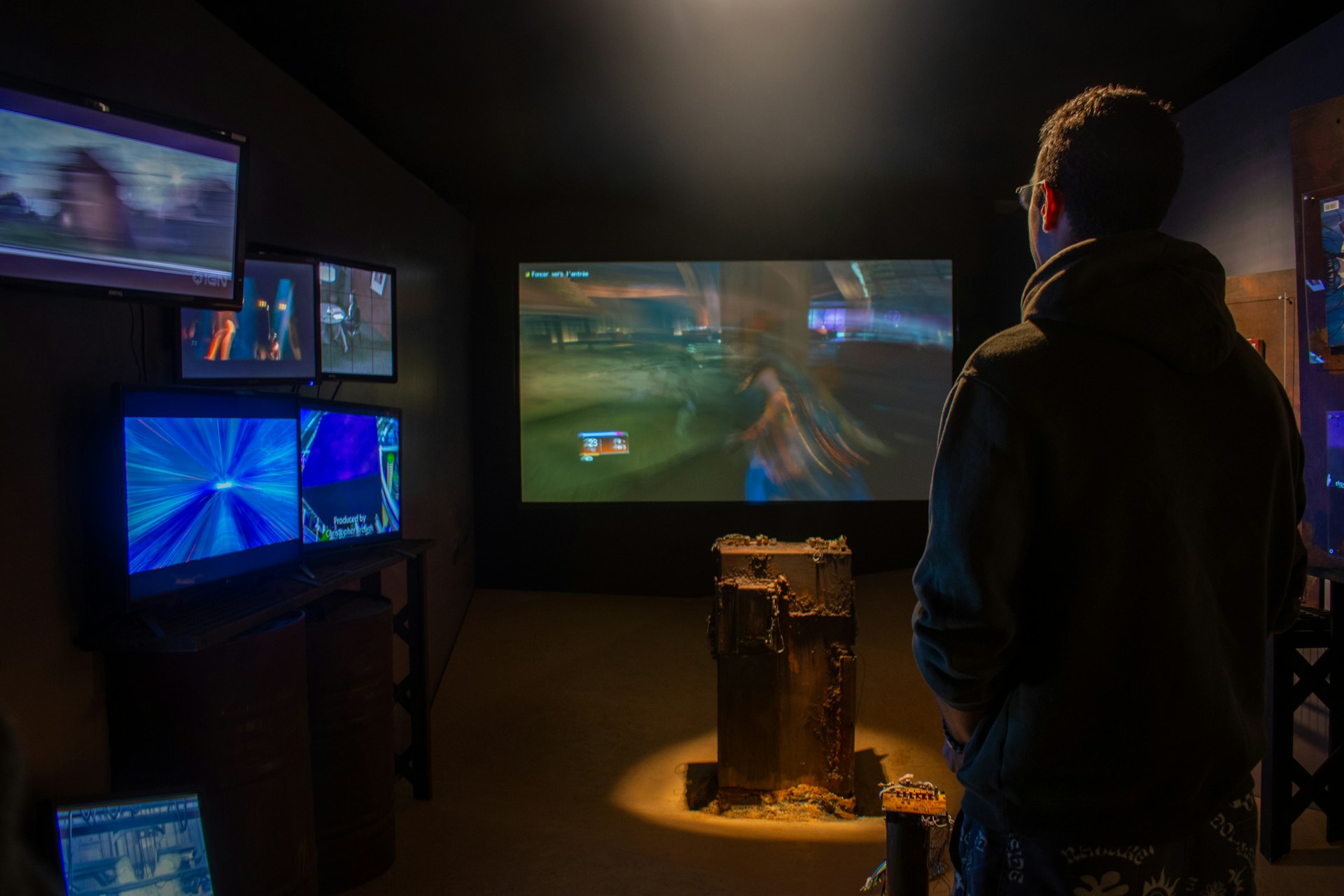How AI-Powered NPC Behavior Is Revolutionizing Immersive Gameplay

Photo by Aleks Dorohovich on Unsplash
Introduction: The New Era of NPC Intelligence
Non-playable characters (NPCs) have long served as the backbone of interactive storytelling in digital games. Traditionally, these entities followed scripted paths and predictable behaviors, offering limited engagement for players. However, the emergence of AI-powered NPC behavior is dramatically reshaping this landscape. By integrating advanced artificial intelligence techniques, developers are unlocking unprecedented levels of immersion and realism, making game worlds feel more alive and responsive than ever before [2] .
The Evolution of NPC AI: From Scripts to Autonomy
Early NPCs operated on simple rules or finite state machines, reacting to player actions with a limited set of responses. Games such as
Half-Life
introduced basic coordination and tactical awareness, but behaviors were largely predetermined
[3]
. The leap to
AI-driven autonomy
began with systems like
Skyrim’s Radiant AI
, which endowed NPCs with daily routines and the ability to react contextually to the player’s choices. This created a more organic and ever-changing environment, where NPCs could hold grudges, show gratitude, or alter their behavior based on the player’s reputation
[1]
.
Key Technologies Enabling AI NPCs
The current wave of innovation is powered by several core technologies:
- Generative AI models (like large language models) allow NPCs to hold natural conversations, develop personalities, and remember past interactions [5] .
- Computer Vision enables NPCs to “see” and interpret player gestures, emotions, and environmental cues, responding with nuanced behavior [2] .
- Reinforcement learning and utility systems give NPCs the ability to adapt strategies, learn from player actions, and make autonomous decisions over time [3] .
Platforms like Inworld AI, Convai, and Charisma are actively developing engines that allow studios to build complex NPC “brains” with emotional ranges and situational awareness specific to their game worlds [5] .
Real-World Examples: AI NPCs in Modern Games
Several blockbuster titles showcase the transformative power of AI NPCs:
- Skyrim : NPCs have daily schedules and react dynamically to player reputation and actions. Their relationships evolve over the course of the game, impacting quest availability and dialogue options [1] .
- Red Dead Redemption 2 : NPCs in the game world remember previous encounters, react to the player’s appearance and choices, and even hold grudges or show gratitude. This creates an immersive, unpredictable journey [1] .
- Cyberpunk 2077: Phantom Liberty : NPCs adjust their emotions and attitudes in real-time, responding to both recent and historical player decisions, which influences storylines and gameplay [2] .
- No Man’s Sky : Procedural generation and AI create vast, evolving worlds where NPCs shape emergent storylines and interactions [2] .
- Middle-earth: Shadow of Mordor : The Nemesis System gives enemies historical memory, allowing them to learn, hold grudges, and counter-strategize against the player [3] .
Practical Steps for Developers: Integrating AI NPCs
Bringing AI-driven NPCs into a game requires careful planning and adherence to best practices. Here is a step-by-step guide for studios and independent developers:

Photo by Adam Valstar on Unsplash
- Define NPC roles and goals. Start by outlining what each NPC should accomplish and how they fit into the narrative or gameplay loop. Consider their background, personality, and emotional range.
- Select appropriate AI models. Choose generative AI platforms or engines that offer character-specific brains and situational awareness. Evaluate tools like Inworld AI or Convai for building deep, context-aware NPCs [5] .
- Design interaction frameworks. Establish how NPCs will communicate, remember, and react to players. Implement memory modules, emotional states, and learning systems to create continuity and consequence [4] .
- Test and refine behaviors. Use playtesting to ensure NPCs act believably and consistently within the game world. Tweak parameters to avoid off-topic or incoherent responses, and minimize hallucinations by restricting knowledge to the game’s lore [5] .
For developers new to AI NPCs, consider joining forums, reading developer blogs, or attending gaming conferences to stay updated on best practices and new tools. If you need technical support, most AI engine providers maintain official documentation and community channels for troubleshooting and guidance.
Accessing AI NPC Technology: Options and Alternatives
If you’re looking to implement or experience AI-powered NPCs, there are several pathways:
-
Play games with advanced AI NPCs.
Titles like
Skyrim
,
Red Dead Redemption 2
,
Cyberpunk 2077: Phantom Liberty
, and
No Man’s Sky
feature state-of-the-art NPC behaviors. These games are available through major platforms such as Steam, PlayStation Store, and Xbox Marketplace. Always consult the official publisher’s website or trusted retailers for availability and pricing. - Experiment with AI creation tools. If you are a developer or enthusiast, platforms like Inworld AI and Convai offer free trials and developer kits. To access these resources, visit the official company websites and follow their application or onboarding instructions [5] .
- Join gaming communities. Online forums, Discord servers, and industry groups often feature discussions on AI NPC development. You can search for “AI NPC gaming forums” or “game development Discord” to find active communities.
Benefits and Challenges of AI-Powered NPCs
Benefits:
- Deeper immersion: NPCs react uniquely to each player, building a sense of unpredictability and realism [2] .
- Dynamic storytelling: Quests and storylines adapt to player actions, resulting in personalized experiences [4] .
- Replayability: Autonomous NPCs ensure no two playthroughs are exactly alike.
- Player engagement: Lifelike interactions foster emotional investment and long-term retention [5] .
Challenges:
- Consistency and coherence: Generative AI models may hallucinate or go off-topic without rigorous training and constraints.
- Performance overhead: Real-time AI processing can impact game performance, especially on older hardware.
- Security and moderation: Open-ended NPC interactions require safeguards to prevent inappropriate content or behavior.
To address these challenges, developers should regularly update AI models, maintain strict content filters, and optimize performance through modular design and cloud-based processing when possible.
Future Trends: Towards Fully Autonomous Digital Beings
The future of AI-powered NPCs points towards fully autonomous digital entities that can interact, learn, and evolve alongside players. As generative AI models grow more sophisticated, expect to see NPCs with persistent memories, emotional depth, and the ability to influence game worlds in novel ways. Upcoming releases such as
The Elder Scrolls VI
and
Grand Theft Auto VI
are anticipated to push these boundaries even further
[2]
.
For those eager to stay ahead, monitoring news from major studios, AI platform providers, and industry analysts will provide the latest insights into these advancements.
Conclusion: Embracing the AI NPC Revolution
AI-powered NPCs represent a pivotal shift in digital gaming, enabling richer worlds, more meaningful interactions, and truly dynamic stories. Whether you are a player seeking deeper immersion or a developer aspiring to create innovative experiences, now is the time to explore the possibilities offered by this technology. With continued research, collaboration, and a commitment to ethical development, the future of gaming promises NPCs that are as complex and engaging as real people.
References
- [1] Genius Crate (2024). Creating Believable NPCs: The Role of AI in Character Interaction.
- [2] Genies (2024). The Evolution of NPCs: How Generative AI is Enhancing In-Game Characters.
- [3] TokenMinds (2024). AI for Games: How AI-Powered NPCs Create More Immersive Player Experiences.
- [4] Inworld AI (2024). AI NPCs and the Future of Gaming.
- [5] Naavik (2024). AI NPCs: The Future of Game Characters.



